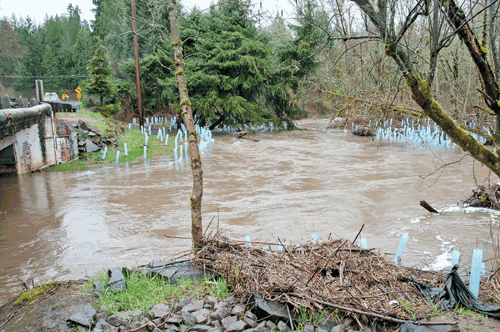
A Little History
Professionals involved with real estate development in the county, such as Eric Golemo, owner of SGA Engineering PLLC, and James Howsley, land use attorney with Jordan Ramis PC, claim the amended permit meets federal water quality and National Pollutant Discharge & Elimination System (NPDES) program standards.
Environmental groups, such as the Rosemere Neighborhood Association, Columbia Riverkeeper, and the Northwest Environmental Defense Center, disagree heartily, and appealed the amended permit to the Pollution Control Hearings Board (PCHB), as well as filed suit in federal court to obtain an injunction against the amended permit.
Regulatory agencies seem to be divided, as the Washington State Department of Ecology (DOE) approved the amended permit, but earlier this year the PCHB ruled the amended permit unlawful. Currently, an appeal of the PCHB’s ruling awaits a hearing in the state Court of Appeals sometime this fall.
What’s the difference?
Rain falls in Oregon. Oregon has salmon. Oregon has many soil types. Oregon has development, as well as environmental groups. So why is storm water management such an upstream battle in Clark County, while things seem to be going swimmingly in Oregon?
One possible reason, according to Benjamin Benninghoff, municipal storm water coordinator for the Oregon Department of Environmental Quality (DEQ), is the Oregon DEQ’s commitment to dialogue.
“Setting up permitting conditions is an iterative process,” said Benninghoff. “We did receive comments from both sides, but so far, we haven’t been challenged on the permits. We continue to have conversations, and continue to refine and improve so we understand each other’s needs.”
In contrast, Bill Moore, storm water lead for the Washington State DOE, stated that “every one of our permits have been appealed” since 2002.
In a recent e-mail statement provided to the Vancouver Business Journal, Dvija Michael Bertish, a representative of the Rosemere Neighborhood Association, stated, “Clark County could have gotten involved in the initial NPDES permit process…They didn’t even provide comments.” However, on May 18, 2006, Clark County Commissioner Marc Boldt penned an 18-page letter to the Washington Department of Ecology with a subject line: “Comments on the Draft NPDES Western Washington Phase I Municipal Stormwater Permit”.
Again, in 2010, the DOE held a public review and comment period from April 21 through
June 7, and held a public hearing in Vancouver. According to the DOE website, they received no formal comments at this hearing – but not long after, the appeal was filed.
Perhaps all interested parties could learn from Portland’s Pollution Prevention Services Group (PPSG), which administers Portland’s industrial storm water program.
According to Marveita Redding, PPSG manager, the current permit took three years to negotiate. The key to the success of the negotiation, said Patrice Mango, NPDES MS4 permit manager, was a “long-term storm water advisory committee” comprised entirely of external stakeholders, such as representatives from the Columbia Corridor Association, Audubon, neighborhood associations, the Homebuilders Association and transportation engineers.
Mango said they sent an outreach mailing to 300 people on a public involvement list, asking for recommendations as to who should be on the committee, which was ultimately appointed by the city commissioner. Far from being an isolated group of 12, Mango said the committee members have ties to the community at large, and bring extensive public sentiment to the meetings.
“There’s a lot of work involved,” said Redding, in determining and implementing policies such as storm water management. “You can’t do it unilaterally.”
Differences in permit standards also contribute to the amount of controversy surrounding storm water management in Clark County in comparison to Oregon.
Peter Livingston, land use attorney with Schwabe, Williamson, & Wyatt’s Portland office, said, “In Washington, the Department of Ecology has imposed more difficult requirements than the Feds require. Pre-European standards are very difficult to meet. The Oregon DEQ hasn’t been as aggressive.”
“Oregon has reasonable thresholds and reasonable performance standards,” added Howsley. “Portland is leading the way, and is going into communities and building regional storm water management facilities.”
Despite local differences, both Moore and Benninghoff said that both states have the same goal, summarized here by Benninghoff:
“We’re all moving toward water quality, using good science, examining cost effectiveness, and looking at site-by-site criteria such as soil type, slope and water table depth.”
Water under the bridge?
The storm water landscape has the potential to change dramatically once again before the end of the year. According to Benninghoff, the EPA is in the process of proposing an entirely new rule relating to post-construction run-off.
Benninghoff said the new draft rule hasn’t been officially sent out for comment yet, though the goal is to have it approved by December. Nonetheless, he added, water quality professionals in both Oregon and Washington are watching the issue closely.
“We state coordinators are all holding our breath,” said Benninghoff. “It needs to allow flexibility for states to implement it, not blow up whole state programs.”



